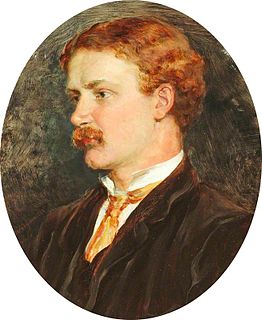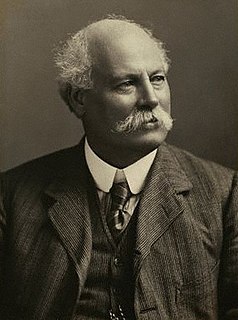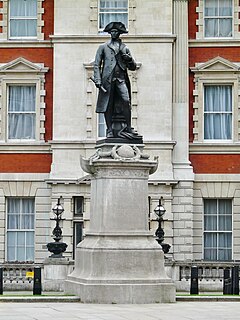
Sir William Hamo Thornycroft was an English sculptor, responsible for some of London's best-known statues, including the statue of Oliver Cromwell outside the Palace of Westminster. He was a keen student of classical sculpture and was one of the youngest artists to be elected to the Royal Academy, in 1882, the same year the bronze cast of Teucer was purchased for the British nation under the auspices of the Chantrey Bequest.

Sir Joseph Edgar Boehm, 1st Baronet, was a medallist and sculptor, best known for the "Jubilee head" of Queen Victoria on coinage, and the statue of the Duke of Wellington at Hyde Park Corner. During his career Boehm maintained a large studio in London and produced a significant volume of public works and private commissions. A speciality of Boehm's was the portrait bust; there are many examples of these in the National Portrait Gallery. He was often commissioned by the Royal Family and members of the aristocracy to make sculptures for their parks and gardens. His works were many, and he exhibited 123 of them at the Royal Academy from 1862 to his death in 1890.

Sir Thomas Brock was an English sculptor and medallist, notable for the creation of several large public sculptures and monuments in Britain and abroad in the late nineteenth and early twentieth centuries. His most famous work is the Victoria Memorial in front of Buckingham Palace, London. Other commissions included the redesign of the effigy of Queen Victoria on British coinage and the massive bronze equestrian statue of Edward, the Black Prince, in City Square, Leeds.

Sir George James Frampton, was a British sculptor. He was a leading member of the New Sculpture movement in his early career when he created sculptures with elements of Art Nouveau and Symbolism, often combining different materials such as marble and bronze in a single piece. While his later works were more traditional in style, Frampton had a prolific career in which he created many notable public monuments, including several statues of Queen Victoria and later, after World War I, a number of war memorials. These included the Edith Cavell Memorial in London, which, along with the Peter Pan statue in Kensington Gardens are possibly Frampton's best known works.

Frederick William Pomeroy was a prolific British sculptor of architectural and monumental works. He became a leading sculptor in the New Sculpture movement, a group distinguished by a stylistic turn towards naturalism and for their works of architectural sculpture. Pomeroy had several significant public works in London and elsewhere in the United Kingdom, notably in Belfast. His work in London includes the figure of Lady Justice (1905–1906) on the dome of the Old Bailey.
Henry Charles Fehr FRBS was a British monumental and architectural sculptor active in the late nineteenth and early twentieth centuries. He produced several notable public sculptures, war memorials and works for civic buildings. These included architectural sculptures for Middlesex Guildhall, for Wakefield County Hall and for Cardiff City Hall. Throughout the 1920s, Fehr created a number of war memorials, often featuring detailed bronze statuary, for British towns and cities. Notable examples of Fehr's war memorials include those at Leeds, Colchester, Keighley and at Burton upon Trent.

A bronze statue of Captain James Cook by Thomas Brock is located near Admiralty Arch on the south side of The Mall in London, United Kingdom. The statue was completed in 1914 and is maintained by The Royal Parks. It is mounted on a stone plinth.

The Royal Tank Regiment Memorial is a sculpture by Vivien Mallock in Whitehall Court, London. It commemorates the Royal Tank Regiment.








